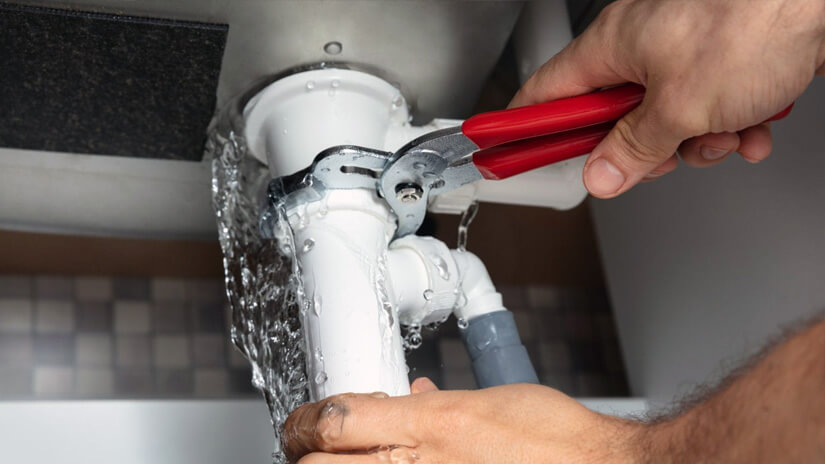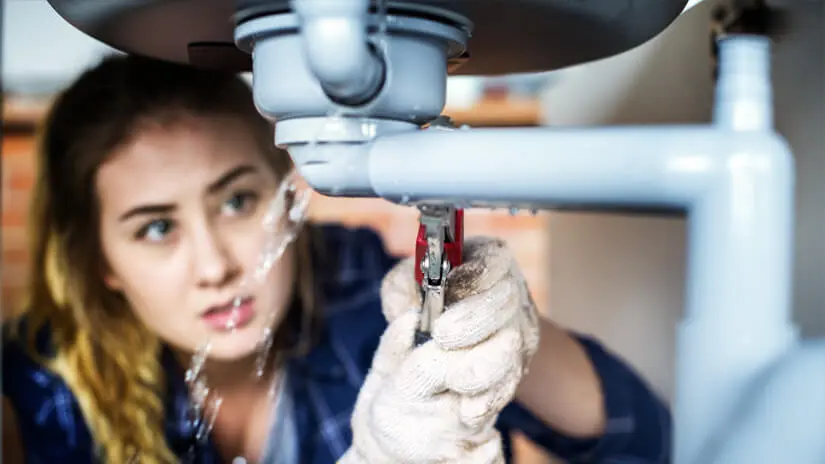Your water pipes play a vital role in ensuring water flows smoothly across your property. If your plumbing isn’t up to par, you might encounter issues that affect your entire home. Leaks, floods, and damage to other areas are just a few problems that could pop up, potentially leading to costly repairs.
Just like every other manufactured item, pipes—whether they’re made of copper, plastic, or metal—have a lifespan. They’re built to last but can still fail over time for various reasons.

When your home experiences a burst water pipe, it can set off a chain reaction to other potentially hazardous and costly plumbing problems for homeowners. Issues caused by a failed water pipe could indicate other plumbing problems, such as a blocked drain in your home. Before calling for an emergency plumbing services provider, let’s look at some causes of burst pipes.
6 Reasons Why Your Water Pipes Burst
Think you may have a burst pipe? Here are some common causes of having your water pipes burst at your home.
1. High water pressure
Water flows through your pipework at various speeds and pressures. The constant or sudden change in pressure can cause instability in the pipe joins, where collapsed and burst pipes occur. A licensed plumber will inspect your home’s water pressure in and around your home. They can help ensure the normal water pressure stays at the Australian Standard. Water pressure should not exceed 500 Kilopascal (kpa) for residential properties.
When water pressure gets too high, it puts strain on your plumbing, which might lead to leaks or even burst pipes. Anything over 500 kpa is risky and could eventually cause a break in your pipes.
2. Blocked Pipes
A blockage somewhere inside the pipework can put a lot of strain on the plumbing. If hair, soap, food and oil build up too much, it can form a barrier and slowly prevent smooth water flow. If the water has nowhere to travel safely, it has no choice but to break through and relieve the built-up pressure causing water leaks and burst pipes.
Poor installation may also cause blocked pipes. That’s why only trust an experienced plumber to do your plumbing work.
3. Corrosion
Rust and corrosion are a high risk of wear and tear in the pipes. Pipes are built to last, but they will start to break down with some things. For instance, copper pipes can last a decade or two but are susceptible to corrosion and pinhole leaks that can escalate to burst pipes.
Rusty pipes become weak, where you get leaks and pipes bursting. You may also experience brown water coming from your taps due to rust.
4. Tree Roots
A reason for a clogged pipe can be tree root intrusions. Tree roots thrive in moist environments, and if there is slight damage in the pipeline that allows water to escape, roots will grab hold and begin to grow internally. Please think of how firm a tree root is, and then imagine it growing in a confined space of a pipe. The strength of the root will cause the pipe to block up and collapse under the high pressure of the root.
5. Moving Soil
Shifting soil can contribute to pipes bursting underground. If a property is undergoing renovations where the outdoor landscape needs to be moved around, you risk compromising your pipes.
6. Freezing Pipes
Water freezes and sets inside the pipes when cold temperatures outside drop in winter. The more water that freezes, the more possibility of a burst pipe is more significant. Frozen pipes will be under pressure and expand with growing ice.
A burst pipe can happen anywhere on your property where water flows, including the hot water pipes. In fact, warm water can freeze faster than cold water, so hot water pipes can pose a greater risk.
How do you stop pipes from bursting?
Dealing with a burst water pipe can be a real headache for any homeowner. The damage can be quite serious, often leading to costly, time-consuming repairs. Keeping your plumbing well-maintained helps avoid burst pipes and larger issues like flooding.

In the colder months, you typically experience frozen pipes. Below are a few tips and suggestions you can implement at home to save your property from burst water pipes.
Keep the faucet running.
You can keep some outside taps turned on slightly to a drop to control flow through the water pipes.
Leave cabinet doors open.
Leaving doors open will let warm air inside the cabinet area. Keep your faucets at a pleasantly even temperature.
Heated tape
Ask a licensed plumbing team about Heat Tape. They can help with insulation to the pipes and prevent pipe freeze.
Seal leaks
Any leaks that can allow cold air to enter a room should be sealed up to prevent cold air from entering the property.
Keep your home warm
When the temperature drops, install a heating device for your property. A gas heater is ideal for keeping your home and fixtures at a warm temperature.
Disconnect the hose from the outside tap.
Ensure you do not leave the garden hose attached to the outside faucet. Eventually, water will begin to freeze up and damage the outside tap.
Install Insulation in your house.
You can have insulation inside the building to protect your household from harsh elements during the cold weather.
At what temperature do pipes burst?
There’s no single temperature that’s a surefire culprit for pipes bursting. Factors like changes in water pressure and sudden drops in temperature can contribute to failure. Plus, the existing condition of your pipes plays a role in how they withstand these shifts.
Can pipes burst in warm weather?
Yes, heat can cause your water pipes to expand from high temperatures and the strain placed on them. During warmer weather, we tend to use more water—whether it’s extra showers or staying hydrated. All this extra demand can increase the chance of pipes bursting due to pressure changes.
Call a plumber
If your water pipes burst, you need a professional local plumber to fix the problem quickly. Our professional plumbers are experts in replacing cracked pipes and carrying out any repairs to burst pipework. They can also perform regular maintenance to minimise plumbing emergencies like burst pipes.
You may need to contact a plumber if one of your pipes has burst. Make sure you call a team of reliable, experienced plumbers and ask your emergency plumber for tips to keep your plumbing system in perfect condition to avoid a skyrocketing water bill.














